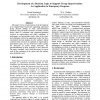Free Online Productivity Tools
i2Speak
i2Symbol
i2OCR
iTex2Img
iWeb2Print
iWeb2Shot
i2Type
iPdf2Split
iPdf2Merge
i2Bopomofo
i2Arabic
i2Style
i2Image
i2PDF
iLatex2Rtf
Sci2ools
108
Voted
HICSS
2002
IEEE
2002
IEEE
Development of a Decision Logic to Support Group Improvisation: An Application to Emergency Response
This paper reviews recent progress in the development of a computer-based system for supporting improvised group decision making in risky, time-constrained situations. One goal of this research is to realize a system design which is consonant with cognitively-grounded research on improvisation and which contributes to performance on representative tasks. Some of the issues and challenges involved in supporting creative but timeconstrained decision making are first outlined. Salient constructs from research on cognition in improvisation, particularly in jazz, are next reviewed in order to frame the discussion of system design principles. The operationalization of these principles is next discussed. The paper concludes with a brief discussion of current work in the evaluation of the system and also outlines areas for further work.
Biometrics | Decision Making | HICSS 2002 | Improvised Group Decision | Timeconstrained Decision Making |
Related Content
| Added | 14 Jul 2010 |
| Updated | 14 Jul 2010 |
| Type | Conference |
| Year | 2002 |
| Where | HICSS |
| Authors | David Mendonça, William A. Wallace |
Comments (0)

